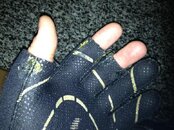Xitesmai
Registered
So I ordered a pair of 3mm gloves from my LDS, however they were back ordered so they ordered the 5mm instead. Which is OK considering we are in a temperate zone so water temps can get down pretty low in fall and winter.
The gloves are fine but its difficult to manipulate some gear because I feel like I have sausage fingers. Had a hard time this weekend manipulating my hood, wrist seals, compass and computer.
However I'm traveling to the Keys in November and doing the Wreck Trek Challenge (or atleast part of it) and I would like a pair of gloves that I can use on the wreck dives (protection for accidentally touching rusty metal, lobster hunting, etc) and maybe use them during future classes...Rescue, EAP, S&R etc.
Could anyone recommend a pair of gloves that would be good for this? Should they be kevlar lined?
I've been looking at the following:
Hollis 4mm Kevlar gloves
Akona 3.5mm ArmorTex
Pinnacle Merino-KarbonFlex
Any help?
The gloves are fine but its difficult to manipulate some gear because I feel like I have sausage fingers. Had a hard time this weekend manipulating my hood, wrist seals, compass and computer.
However I'm traveling to the Keys in November and doing the Wreck Trek Challenge (or atleast part of it) and I would like a pair of gloves that I can use on the wreck dives (protection for accidentally touching rusty metal, lobster hunting, etc) and maybe use them during future classes...Rescue, EAP, S&R etc.
Could anyone recommend a pair of gloves that would be good for this? Should they be kevlar lined?
I've been looking at the following:
Hollis 4mm Kevlar gloves
Akona 3.5mm ArmorTex
Pinnacle Merino-KarbonFlex
Any help?






